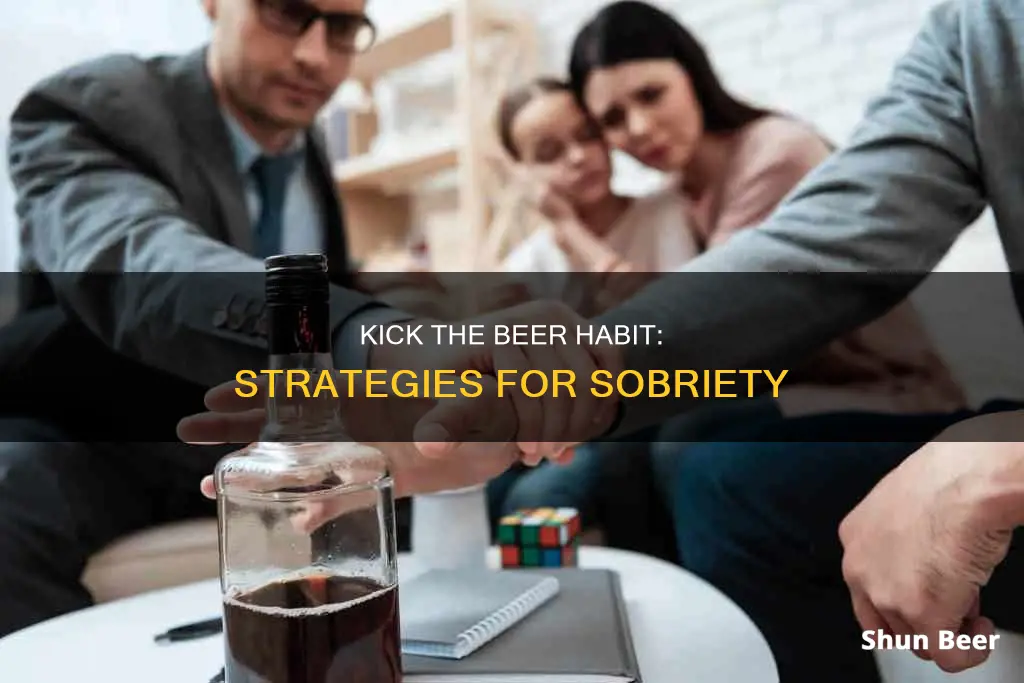
Quitting drinking is a challenging but rewarding endeavour that can bring about significant improvements in your physical and mental health. Understanding your relationship with alcohol is key to giving it up. This involves examining your drinking habits and identifying the triggers that make you want to drink. It's also important to set clear and realistic goals, build a support system, and develop healthy habits to replace your drinking routines.
If you're dependent on alcohol, quitting cold turkey can be dangerous and lead to physical withdrawal symptoms. It's crucial to consult a doctor or healthcare professional for guidance and support. They can help you decide whether it's best to cut back or abstain completely.
| Characteristics | Values |
|---|---|
| Understand your relationship with alcohol | Identify why you want to quit drinking and how much you drink |
| Set goals | Define clear and realistic goals, such as improved physical health or stronger relationships |
| Build a support system | Surround yourself with family and friends or join a community of individuals with similar goals and experiences |
| Find alternatives | Explore non-alcoholic alternatives to your favourite beverages, such as mocktails or non-alcoholic beer |
| Develop healthy habits | Add exercise, mindfulness or meditation to your routine, and eat a balanced diet |
| Understand your triggers | Identify times and reasons that make you want to drink, such as being with friends or feeling anxious |
| Create a daily plan | Structure each day with purpose and positive activities to reinforce your commitment to change |
| Celebrate milestones | Recognise and celebrate your achievements, such as one day, one week, or one month without alcohol |
| Seek professional help | Consult a healthcare professional, therapist, or support group if needed |
What You'll Learn

Understand your relationship with alcohol
Understanding your relationship with alcohol is a crucial step in quitting drinking. Here are some detailed and focused instructions to help you gain that understanding:
Identify your drinking patterns
The first step is to be honest with yourself about your drinking habits. Do you drink every day, or only on certain occasions? How much do you actually drink? Are there specific times of day when you are more likely to drink? Are there certain people or places that encourage your drinking? Understanding your drinking patterns will help you identify triggers and develop strategies to avoid or manage them effectively.
Recognise the impact of alcohol on your life
Examine the role that alcohol plays in your life and how it affects you. Consider the health effects of alcohol, both physically and mentally. Even moderate drinking can lead to grogginess, fogginess, or a hangover. Excessive drinking can cause increased anxiety, depression, irritability, and conflict with loved ones. It can also lead to high blood pressure, heart disease, stroke, and an increased risk of certain cancers. Recognising these negative consequences can be a powerful motivator for change.
Identify your reasons for drinking
Understanding why you drink is essential. Are there specific triggers or cues that lead you to drink? For example, do you drink to relax after a stressful day, to fit in with friends, or to cope with difficult emotions? Identifying your reasons for drinking will help you explore alternative ways to address those issues more productively.
Understand your addiction
If you feel that you have lost control over your drinking, it's important to recognise that alcohol addiction is a form of substance abuse with severe consequences for your physical and mental health. Review medical insights to better understand your addiction and the signs of alcohol withdrawal. This knowledge will empower you to make informed choices and seek appropriate support services.
Set clear and realistic goals
Before you begin your journey, define your goals. What do you hope to achieve by giving up alcohol? Improved physical health, better mental clarity, stronger relationships, or increased productivity? Having clear objectives will guide you and motivate you to stay on track.
Build a support system
Quitting alcohol is a personal journey, but having a support system is crucial. Share your decision with trusted family and friends who can provide encouragement and accountability. Consider joining a community or local support group where you can connect with others who share similar goals and experiences. Their understanding and encouragement can be invaluable during challenging times.
By following these steps, you will gain a deeper understanding of your relationship with alcohol, which will empower you to make positive changes and work towards a healthier and more fulfilling life.
Beer Consumption: Blindness Risk and Visual Health
You may want to see also

Identify triggers and plan how to manage them
Identifying your triggers is a crucial step in quitting drinking. A trigger is anything that makes you want to drink, and common examples include being with friends, being alone, or feeling happy or anxious. Being aware of your triggers can help you plan ways to manage the urge to drink.
- Keep a drinking diary: Track every drink you have for three to four weeks. Note what and how much you drank, as well as the location and your mood. This will help you identify patterns and triggers and allow you to make a solid plan for dealing with those situations.
- Pinpoint people, places, and events associated with drinking: Being around certain people, places, or events can trigger your desire to drink. Identify these connections and, if possible, avoid them. If avoidance is not an option, admit your desire to drink without judging yourself. Have your goals written down to remind yourself why you've dropped drinking.
- Understand why you drink: Knowing why you drink is essential. It can help you explore alternative ways to address those issues more productively. For example, if you drink to calm anxiety, try affirmations, deep breathing, or meditation instead.
- Change your environment: Remove alcohol from your house to avoid temptation. Opt for non-alcoholic alternatives such as water, flavoured sodas, teas, or mocktails.
- Plan ahead for challenging situations: If you know you'll be in a situation where you'll be offered a drink, practice how you'll say "no, thank you" beforehand. Have a follow-up explanation ready if someone asks why you're not drinking.
- Stay busy and distract yourself: Engage in activities that get you out of the house and moving. Take up new hobbies, join a gym, learn a new skill, or find sober social groups to fill your time.
- Build a support system: Share your goal of quitting drinking with trusted family and friends. They can provide encouragement and support and help hold you accountable. Consider joining local support groups or reaching out to other sober people for additional support.
- Practice self-compassion: Quitting drinking is a challenging journey, and setbacks are normal. Be kind to yourself, and remember that no one is perfect. Learn from your mistakes and maintain a curious and open outlook as you navigate what works best for you.
Beer Overload: How Much is Too Much?
You may want to see also

Set clear and realistic goals
Setting clear and realistic goals is an important step in quitting drinking. Firstly, it is crucial to understand your drinking habits and patterns. This involves being honest with yourself about how much and how often you drink. Keeping a diary for a few weeks can help you gain insight into your drinking behaviour. Note down what and how much you drank, where you were, and how you were feeling. This will help you identify any triggers and patterns, such as drinking when feeling stressed or anxious, or drinking more than planned when in the company of certain friends.
Once you have a clear understanding of your drinking habits, you can start setting specific and achievable goals. For example, you may decide to set a daily or weekly drink limit, with the goal of not exceeding a certain number of drinks per day or week. These limits should be in line with recommended guidelines: no more than one standard drink per day for women and men over 65, and no more than two standard drinks per day for men under 65. However, it's important to discuss these limits with your doctor, as they may be too high for certain individuals with medical conditions or other risk factors.
In addition to quantity, consider other aspects of your drinking behaviour that you want to change. For instance, you may want to stop drinking on an empty stomach, or you may want to designate certain days as alcohol-free. These goals should be tailored to your specific needs and challenges.
It's important to keep your goals realistic and manageable. Breaking them down into smaller, achievable milestones can make them feel less daunting and help you stay motivated. For example, you might start by committing to a month of sobriety or gradually reducing the number of drinks you consume each week.
Finally, regularly review your goals and be prepared to adjust them as needed. Quitting drinking is a journey, and your goals may evolve as you make progress and face new challenges. It's also important to be kind to yourself and remember that setbacks are normal. If you find yourself struggling, reach out for support from family, friends, or a professional.
Beer and Zyrtec: Is It Safe to Mix?
You may want to see also

Build a support system
Building a support system is an important step in quitting drinking. This can be a personal journey, but having a support system is crucial. Here are some ways to build a support system:
- Reach out to family and friends: Let your loved ones know about your decision to quit drinking. They can provide encouragement and support, and you may even inspire them to examine their drinking habits. Consider bringing a trusted friend or family member to events where alcohol is served to help you turn down drinks more easily.
- Join a community or local support group: Connecting with others who share similar goals and experiences can be incredibly beneficial. Look for communities or support groups, either locally or online, where individuals are also trying to quit drinking or cut back. For example, you could try a 12-step program like Alcoholics Anonymous or SMART Recovery.
- Seek help from healthcare professionals: Talk to your doctor or therapist about your decision to quit drinking. They can provide guidance and referrals to additional resources. If you feel comfortable, you can also discuss your challenges with your primary healthcare provider, who may refer you to an alcohol counsellor or support group.
- Find sober friends or social groups: Spending time with other non-drinkers can be helpful, as you can support each other and participate in social activities that don't revolve around alcohol.
- Lean on trusted friends or family when you have the urge to drink: It's important to have people you can talk to when you're struggling. Share your goals with them and ask for their support in achieving them.
Remember, building a support system is about finding people who can encourage and understand you throughout your journey. Don't be afraid to reach out and ask for help when you need it.
Sweet Drinks and Beer: A Healthy Mix?
You may want to see also

Find tasty alternatives to beer
Finding tasty alternatives to beer is an important part of taking control of your relationship with alcohol. It can help you break the routine associated with drinking and make social situations more comfortable. As people are increasingly focusing on health, there is a growing demand for alcohol-free beers, mocktails, and other non-alcoholic drinks.
Water is always a good option, but you might also want to try flavoured sodas or teas. Mocktails can give you the flavour of a mixed alcoholic drink without the harmful effects. You could also try non-alcoholic wine or cider.
If you're looking for something a little more special, there are plenty of sophisticated adult soft drinks on the market these days. For example, you could try kombucha, a fermented tea with a slight fizz and a tangy flavour. Or, for something truly indulgent, there are alcohol-free spirits that can be used to make sophisticated cocktails without the alcohol content.
Finding enjoyable substitutes will help eliminate the desire for a drink and make your journey towards sobriety that little bit easier.
Are Beer Chunks Safe to Drink?
You may want to see also
Frequently asked questions
The first step is acknowledging your relationship with alcohol and understanding your reasons for wanting to quit. It is also important to consult a healthcare professional, especially if you are dependent on alcohol, to ensure a safe detoxification process.
It is crucial to set clear and realistic goals, such as improved health, better relationships, or enhanced productivity. Writing down your reasons and keeping them visible can serve as a reminder and boost your motivation. Celebrating milestones and acknowledging your progress is also an excellent way to stay motivated.
Identify your triggers, whether they are certain people, places, or events, and try to avoid them if possible. Develop a plan for how you will respond when offered a drink, and practice saying "No, thank you." Keep alcohol out of your house, and find alternative beverages that you enjoy, such as mocktails or non-alcoholic beer.
It is essential to have a support system of trusted family and friends who can provide encouragement and accountability. Consider joining local support groups or communities with similar goals, such as Alcoholics Anonymous or SMART Recovery.
Develop healthy habits such as regular exercise, mindfulness or meditation practices, and a balanced diet. Engage in new hobbies and activities that do not involve drinking, and spend time with other non-drinkers. Prioritize self-care and make time for activities that bring you joy and help you relax.







